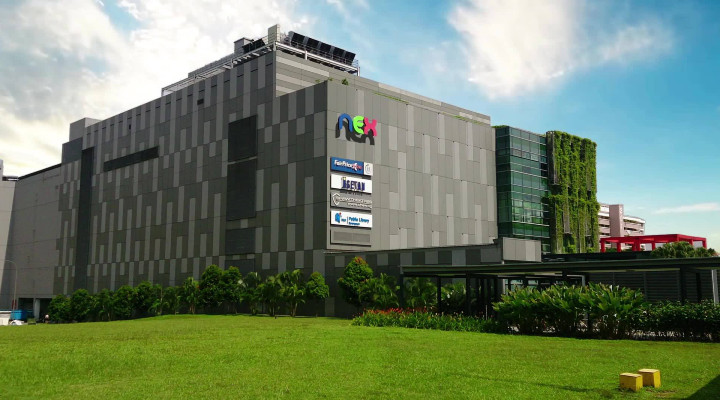The biggest mall in northeast Singapore, Nex, is positioned as a vibrant, social and recreational seven-storey hub for the community with an eclectic mix of retail, entertainment and dining options. But what really sets the mall apart from the rest is its multiple sustainability initiatives and programmes, which are helping Nex connect with the next generation of consumers. Eugene Toh, senior manager of operations at Nex, and a 25-year industry veteran, said the mall has been actively work
y working to make its operations more eco-friendly.
“Through a series of green initiatives by the mall and in collaboration with partners such as local circular fashion enterprise, Cloop, Nex aims to encourage eco-friendly choices in line with the mall’s commitment towards eco-consciousness,” he told Inside Retail.
This can be seen in the application of ‘cool mist paint’ on the building’s facade. This type of paint reflects solar radiation to minimise heat absorption and keep the interior cool.
Sustainable energy sources are another feature of the mall. Thanks to the use of 1,104 solar panels, the mall can generate a peak capacity of 596.16 kWp and is capable of generating about 700,000 kWh over the course of a year.
The panels installed across the rooftops of Shaw Theatre and the National Library Board are used to power chiller operations in the mall.
Furthermore, Nex’s restrooms feature eco-friendly appliances, such as Simxin taps and Dyson Airblade dryers. Simxin taps have a low flow rate of less than a litre of water per minute, compared to 2.4 litres per minute for other brands.
This has helped reduce the mall’s water consumption by more than 30,000 cubic metres of water per year.
Eugene Toh, senior manager of operations at Nex
Holistic initiatives
As part of a recent campaign, the mall teamed up with local circular fashion enterprise, Cloop, to run a textile donation drive. Shoppers were invited to donate their preloved textiles for reuse, upcycling and recycling.
This textile donation drive collected over 1800 kg of textiles, which were then sorted into more than 500 categories with a zero-waste-to-landfill process, reducing fashion waste and encouraging shoppers to make more eco-friendly choices.
Cloop’s textile recycling bin is now a permanent feature at the mall and has collected a further 4226kg of textiles to be recycled.
The mall has also been collaborating with its food and beverage tenants to collect used cooking oil, which is then processed and converted into biodiesel and other commercial products. Over the past year, the mall has collected 3,200kg per month from 30 participating tenants.
Additionally, Nex is encouraging tenants such Cold Storage, FairPrice Finest, Food Republic and to recycle unsold perishable fruits and vegetables and food waste through its food digester.
The mall introduced the food digester back in October 2021, and started with an initial rollout of two supermarkets and two food courts. The machine converts food waste into compost fertilisers, which are then utilised for the landscaping at the mall.
Forward planning
Nex has also installed a rainwater harvesting tank with a capacity of 14 cubic metres and will be adding an irrigation system in the near future. The mall is able to collect 1400 cubic metres of water, assuming it rains 100 days a year, that can be used as needed.
“We believe in working very closely with our tenants and the importance of collaboration in working towards more sustainable achievements for the mall. In general, Nex has actively encouraged its tenants to adopt the 3R principles – reduce, reuse and recycle,” Toh said.
While Toh acknowledged that shoppers these days are more environmentally conscious, he reiterated that the mall’s motive of implementing sustainable solutions is to ensure it operates responsibly for current and future generations of shoppers.
“We are in talks with several NGOs to set up an area in the mall for food box collection from the public, thus engaging more people in the northeast region to participate as well as furthering the mall’s sustainable goals,” he added.
So far, the sustainability initiatives have resulted in a 11 per cent decrease in electricity consumption, 22.5 per cent reduction in water consumption and a 17.5 per cent reduction in general waste disposal.

